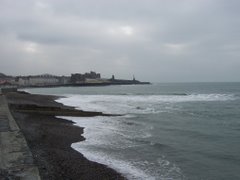One of my favourite holidays is upon us and I’m probably one of only a handful of people in England who is looking forward to it.
Halloween, you see, is not terribly popular with the British. But it’s not just because the British have overly developed senses of superiority over anything deemed too American --it’s because Halloween is actually pretty awful here.
Like most holidays celebrated in Western society, Halloween combines pagan and Christian elements.
The History Channel’s website says Halloween’s origins date back to the ancient Celtic festival of Samhain (pronounced sow-in).
The Celts celebrated their new year on November 1. This day marked the end of summer and the harvest and the beginning of the dark, cold winter, a time of year that was often associated with human death. Celts believed that on the night before the new year, the boundary between the worlds of the living and the dead became blurred. On the night of October 31, they celebrated Samhain, when it was believed that the ghosts of the dead returned to earth. In addition to causing trouble and damaging crops, Celts thought that the presence of the otherworldly spirits made it easier for the Druids, or Celtic priests, to make predictions about the future. For a people entirely dependent on the volatile natural world, these prophecies were an important source of comfort and direction during the long, dark winter.
It continues:
By the 800s, the influence of Christianity had spread into Celtic lands. In the seventh century, Pope Boniface IV designated November 1 All Saints’ Day, a time to honor saints and martyrs. It is widely believed today that the pope was attempting to replace the Celtic festival of the dead with a related, but church-sanctioned holiday. The celebration was also called All-hallows or All-hallowmas (from Middle English Alholowmesse meaning All Saints’ Day) and the night before it, the night of Samhain, began to be called All-hallows Eve and, eventually, Halloween.
Since the 1800s, Halloween has gone in one direction in North America, and a different direction in England.
So although Halloween is not actually American, the images that a lot of people associate with Halloween are from North America, where the day has become a day to dress up in fun costumes -- whether you’re a rock star, a ghost or a fairy princess -- to eat too much candy and chocolate, and to say hello to your neighbours before relieving them of treats. For the most part, it’s harmless fun.
In England, the day has retained its sinister edge. If anyone dresses up, it’s usually as something dead, or nearly dead -- men smear blood on their clothes and women dress in fish-net stockings and wear a lot of black make-up. Kids don't go trick-or-treating because nobody stocks a bowl of sweets by the door. I’ve heard that some kids knock on doors and ask for money, rather than sweets, and then if they don’t get money, they vandalise the person’s property. I’m not surprised the day is unpopular.
It's too bad that Halloween hasn't developed into something a bit more enjoyable in England.
Of course, it's not all innocent fun in North America either. Having kids run from door to door in the dark, often wearing masks that prevent them from seeing properly, when there's traffic is just asking for trouble. I'm sure the ambulance services and police departments despise Halloween. And I can remember, as a child, we were always warned never to eat home-made sweets from strangers because it was said they could be poisoned. Other kids told you stories about razor blades in your caramels. And then, every Halloween, you always had older siblings, either yours or your friend's, jumping out from behind trees or dragging you into the graveyard to scare the wits out of you.
But then, Halloween wouldn’t be nearly as much fun without an element of fear. Trouble is, now that I'm an adult, I can't really drag my British friends into graveyards or spook them with stories about the crazy old lady with the deadly candied apples.
I could, however, throw a scary party. I could serve caramels, miniature Mars bars and green JELL-O, and then put The Monster Mash on the stereo. And then when everyone is enjoying themselves, I will scare the wits out of them. Since there's nothing scarier to British people than the words "housing development" and "falling house prices", I’ll arrange to plant a couple of Daily Mail journalists and some members of the Countryside Alliance in the crowd to stir up trouble. They could say things like: "Oh you live beside that greenbelt? Isn't it a shame that that's up for sale? The massive housing development is sure to ruin your view and drive down the price of your house. You know, local authorities should take advantage of the provision in Planning Policy Statement 7, which allows for land unsuitable for commercial development to be used for affordable housing." The Daily Mail journalists can then go: "Oh yes, I heard that John Prescott can just snap his fingers and wherever he says, they build 10,000 homes. It could be anywhere. It could be right beside your house."
Oh, it’s brilliant. I can see everyone’s horrified faces already.
Monday, October 16, 2006
Subscribe to:
Post Comments (Atom)

No comments:
Post a Comment